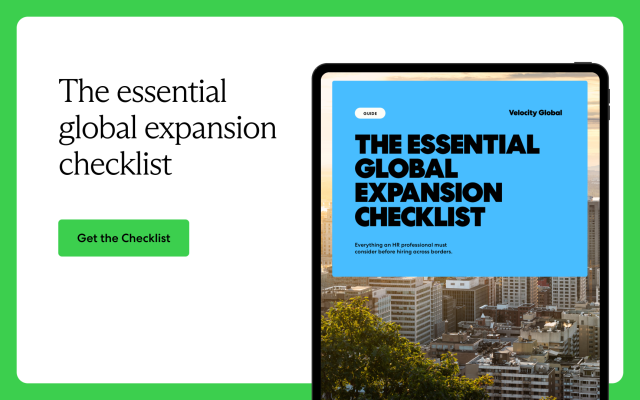A key part of global compliance involves navigating value-added tax (VAT) regulations in foreign markets. This entails collecting, reporting, and remitting VAT according to local laws while identifying exemptions, reductions, and refunds to optimize costs.
Understanding VAT regulations in multiple countries can overwhelm accounting and finance teams and expose your company to serious risks, including fines and imprisonment. Fortunately, ensuring VAT compliance doesn’t have to be complicated.
This guide covers everything you need to know about navigating VAT in the global marketplace. Find a concise VAT definition, learn why it matters for international expansion, and find tips on ensuring VAT compliance for a distributed team.
What is value-added tax (VAT)?
VAT is a consumption tax that governments levy on goods and services at each stage of the production or distribution cycle. In supply chain transactions, buyers pay VAT and sellers collect VAT. This ongoing exchange offsets VAT burdens for businesses while passing the burden on to the end customer. VAT is called a goods and services tax (GST) in some countries.
In other words, businesses in the supply chain pay VAT on inputs, or goods and services they purchase, while they receive VAT payments on outputs, or goods and services they sell. When a business sells the final good or service to an end customer, the customer pays the full VAT value, which the business then remits to local tax authorities.
While VAT regulations vary worldwide, businesses generally deduct their inputs from outputs to get their final VAT liability. They can apply for an input tax credit if they have a deficit. Most businesses can also reclaim VAT costs on goods and services they use exclusively for their business.
Tax authorities usually implement a standard VAT rate for all goods and services while offering reduced rates and exemptions to support policy objectives. For instance, governments often exempt essential services, such as education and healthcare, to ensure they remain affordable and cost-effective.
VAT rates vary drastically between countries. Hungary has one of the highest VAT rates worldwide at 27%, while Canada has one of the lowest at 5%. The U.S., Syria, and Cambodia are among the few countries that don’t have VAT.
The table below compares VAT rates in six OECD countries:
| Country | VAT Rate |
|---|---|
| Hungary | 27% |
| Poland | 23% |
| Belgium | 21% |
| Australia | 10% |
| Korea | 10% |
| Canada | 5% |
The impact of VAT on the global economy
VAT systems play an integral role in the global economy. Through VAT, governments can shape fiscal policies, promote economic growth, facilitate international trade, and ensure sustainable public finances.
We outline how VAT impacts the global economy below:
- Revenue generation. VAT is a major source of government revenue worldwide, providing a stable and predictable stream of income that helps fund public services and infrastructure development.
- Consumption tax. By taxing consumption rather than income or profits, VAT discourages excessive consumption and encourages savings and investment. This helps promote economic stability and sustainability.
- Fiscal policy tool. Governments can adjust VAT rates to influence consumer spending, stimulate or constrain economic activity, and address social and environmental issues. For instance, governments can offer lower rates on environmentally friendly products to increase adoption.
- Trade neutrality. International trade usually follows the destination principle, under which exports don’t incur VAT, and imports face local VAT rates. Such international trade regulations help prevent distortions in trade patterns and promote fair competition in the global marketplace.
- Simplification of tax systems. VAT simplifies tax administration by replacing multiple indirect taxes with one comprehensive tax. This reduces compliance costs, administrative burdens, and tax loopholes, and fosters efficiency and transparency in the tax system.
- Revenue harmonization. Coordination efforts in economically integrated areas like the EU standardize VAT rules and rates across member states. This facilitates increased regional trade, enhances economic integration, and harmonizes revenues across international supply chains.
- Counteracting tax evasion and the informal economy. Businesses need invoices and receipts to reclaim input tax credits. This creates a paper trail of transactions across the supply chain, helping reduce tax evasion and the informal economy.
What is VAT compliance?
VAT compliance refers to a company’s adherence to local rules, regulations, and requirements for collecting, reporting, and remitting VAT. Any business operating in a country with a VAT system must comply with local VAT regulations to avoid financial penalties and legal setbacks.
Why VAT compliance matters in global expansion
VAT compliance matters in global expansion as it impacts many aspects of a business’s growth strategy, from risk mitigation and market access to efficiency and cash flow management.
By obtaining accurate VAT quotes and ensuring compliance, organizations can avoid financial and legal setbacks and improve their chances of finding success overseas.
Below, we list the main ways VAT compliance impacts a business’s global expansion strategy:
- Tax compliance. Non-compliance with VAT regulations exposes an organization to fines and costly litigation. Understanding and mitigating these risks is essential for success.
- Cost considerations. VAT significantly impacts the total cost of goods and services in a country. Businesses must factor in VAT rates, exemptions, and regulations when pricing their products or services and determining their competitiveness in new markets.
- Cash flow management. Businesses must collect VAT on sales and remit it to tax authorities within specified timeframes, which can impact cash flows. Understanding VAT refund procedures and timelines can help businesses better manage their cash flows in international markets.
- Market access. VAT compliance can impact how customers and partners perceive your organization. Businesses that comply with VAT regulations and offer transparent pricing gain trust within their sector, which increases market share and creates growth opportunities.
- Supply chain efficiency. VAT costs can influence sourcing, production, and distribution decisions. Businesses must consider these implications when designing and optimizing their supply chains to ensure compliance and minimize costs.
- Tax planning and optimization: VAT can be complex, but understanding its nuances helps you simplify compliance and reduce costs. Identify exemptions, reductions, margin schemes, refunds, and other special regimes in your target market to minimize VAT liabilities and maximize profitability.
Expanding your business abroad? Get our essential global expansion checklist that reveals key insights on developing your global expansion strategy, conducting market research, hiring international employees, and ensuring compliance at every step.

Penalties for VAT non-compliance
VAT non-compliance penalties range from fines to criminal prosecution, depending on the country and violation severity. In the U.K., for instance, the initial penalty for late VAT returns is £200, while deliberate VAT evasion or fraud can lead to imprisonment.
Common penalties for VAT non-compliance include the following:
- Fines. Tax authorities usually impose fines for late filings and payments, invoicing and recording errors, and other violations. The penalty size depends on various factors, such as the amount of unpaid VAT, period of non-compliance, and violation severity.
- Interest charges. Tax authorities often charge interest on past-due VAT, which accrues until the organization satisfies its liability.
- Loss of input tax credits. Authorities may revoke an organization’s right to reclaim input tax credits, which increases the company’s tax burden and financial losses.
- VAT registration suspension or revocation. Tax authorities may suspend or revoke a company’s VAT registration for repeated violations, resulting in lost tax credits and reputational damage.
- Criminal prosecution. Tax authorities may pursue criminal prosecution for deliberate VAT fraud or evasion, which can result in overwhelming fines and imprisonment.
How to ensure VAT compliance when expanding abroad
Global companies must exercise due diligence to ensure VAT compliance when operating in new markets. This includes familiarizing themselves with local regulations, filing accurate reports, and staying abreast of ongoing regulatory changes.
Below, we provide a list of steps all global businesses should take to mitigate their VAT risk:
- Understand local VAT regulations. Research local VAT regulations in your target markets. Clarify rates, thresholds, exemptions, registration requirements, filing deadlines, invoicing rules, and other relevant laws.
- Register for VAT. Determine if you need to register for VAT in your target country. If necessary, register within the specified timeframe.
- Collect and record VAT. Collect VAT on all applicable sales and maintain accurate records of all VAT-related transactions.
- Issue proper invoices. Issue compliant invoices that contain necessary information, such as your business info, customer details, VAT identification numbers, service descriptions, and VAT rates.
- File VAT returns. File VAT returns according to monthly, quarterly, or annual cycles. Report all VAT your business has collected and paid throughout the reporting period and deduct inputs from outputs to determine your net liability.
- Remit VAT payments. Submit timely VAT payments to local tax authorities and track payment due dates to avoid late penalties and interest.
Reclaim input tax credits. If eligible, reclaim your input tax credits according to local procedures. - Stay abreast of changes. Stay up-to-date on regulatory changes in each market. Monitor tax authority announcements, conduct internal audits, and adjust your VAT practices accordingly.
- Implement internal controls. Use internal controls to mitigate risk. Train employees responsible for handling global VAT compliance, maintain proper documentation, and conduct regular reviews and audits to identify and resolve issues.
- Seek professional advice. Consider enlisting third-party tax professionals, accountants, or legal advisors with experience in international VAT regulations to ensure global compliance. In-country experts can provide guidance tailored to your circumstances and help you navigate complex requirements.
By following these steps and actively monitoring regulatory changes in each market, global companies can reduce their risk exposure and avoid major setbacks as they expand their global footprint.
VAT compliance FAQ
Below, you can find answers to common questions about global VAT compliance.
Who pays VAT tax?
All parties involved with every transaction in the supply chain pay VAT. Sellers collect VAT (output), and buyers pay VAT (input). Outputs generally offset inputs as businesses exchange goods and services along the supply line, placing the tax burden on the end customer.
How is VAT enforced?
VAT systems have a self-enforcing mechanism. Downstream entities need supplier receipts to calculate their VAT liability and reclaim tax credits, which creates an auditable paper trail along the supply line. Tax authorities worldwide also implement registration and reporting requirements, issuing penalties for inaccurate filings, delayed reports, evasion, and fraud.
What is VAT registration?
VAT registration refers to listing your business with local tax authorities as being active in production and sales. Once a business registers for VAT, it must collect, report, and remit VAT and can apply for VAT refunds on qualifying company purchases.
Registration is a critical first step for ensuring global VAT compliance. Failing to register a qualifying business for VAT can result in fines, damaged business reputation, and criminal proceedings.
What triggers a VAT compliance check?
Different events trigger VAT compliance checks, depending on your jurisdiction and individual circumstances. For instance, reporting discrepancies or large claims from small firms can trigger reviews. Tax authorities in some countries also perform regular checks based on random selection.
What services are VAT exempt?
Some goods and services are VAT-exempt, depending on the country and industry in which a business operates. Tax authorities usually exempt essential supplies from VAT, such as education and healthcare services, to ensure they remain affordable and easily accessible.
Common VAT-exempt supplies include the following:
- Education services
- Financial services
- Healthcare services
- Charitable fundraising events
- Membership subscriptions
- Commercial real estate sales, leases, and rentals
- Taxable supplies of goods or services below a certain limit
VAT-exempt companies do not need to register for VAT or keep VAT records since they cannot charge VAT on sales, reclaim VAT on business expenses, or submit VAT returns.
Manage VAT compliance with Velocity Global
Don’t let complex VAT regulations stop you from tapping into new, lucrative markets. Ensure compliance and streamline your expansion by partnering with Velocity Global.
As a part of our employer of record (EOR) solution, we provide accurate, transparent VAT quotes for over 185 countries, giving global companies peace of mind as they expand.
With an unmatched commitment to accuracy, our team of in-house and regional experts rigorously audits, updates, and maintains tax quotes worldwide, ensuring ongoing compliance even as country conditions change.
We factor in calendar and tax years, monitor out-of-cycle regulatory changes, and account for region and industry-specific developments to ensure our quotes are always current. Plus, transparency guarantees you don’t absorb any hidden costs or fees.
Contact us today to learn how we can help you ensure global VAT compliance and stay on budget no matter where you expand next.
Disclaimer: The intent of this document is solely to provide general and preliminary information for private use. Do not rely on it as an alternative to legal, financial, taxation, or accountancy advice from an appropriately qualified professional. © 2024 Velocity Global, LLC. All rights reserved.




